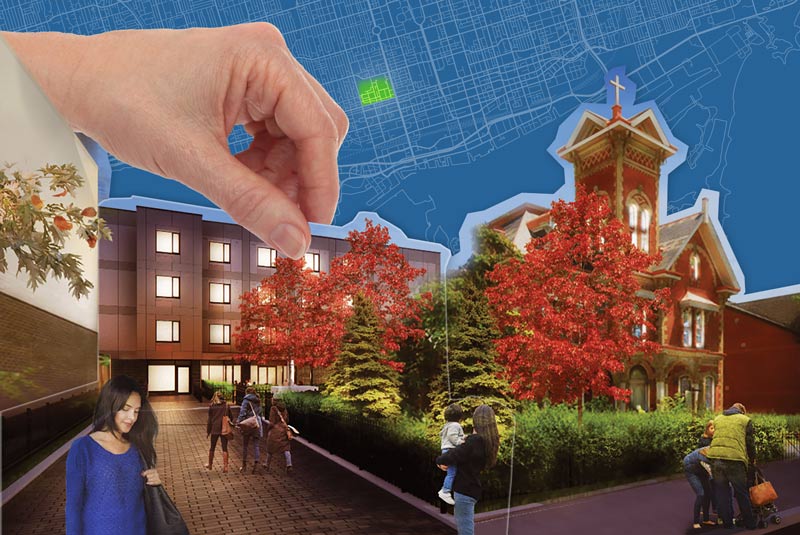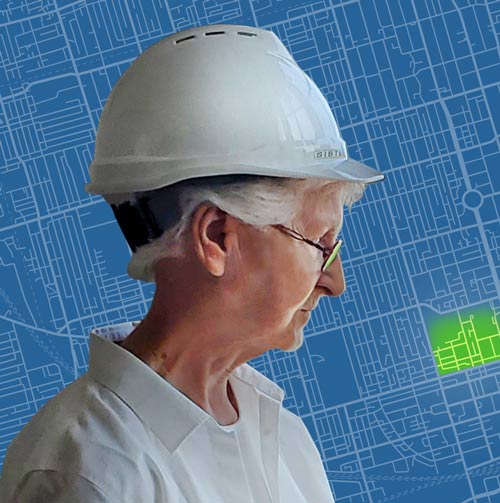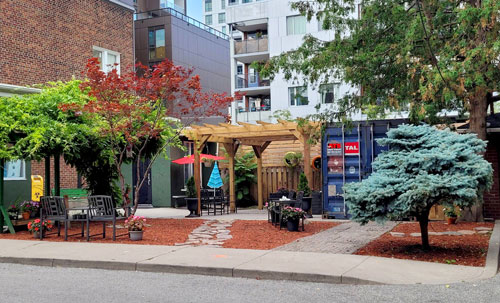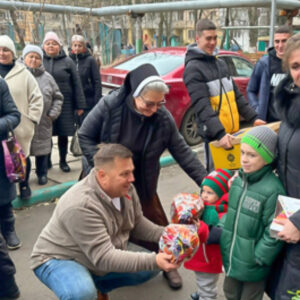
Rendering of the 31-unit Rapid Housing project (left) that will provide affordable and supportive housing for women and women with children experiencing homelessness and/or intimate partner violence in Toronto.
Sometimes, to truly reach people who are struggling, you have to push the boundaries of what’s allowed. Sometimes, what’s always been done isn’t good enough. So, if you work at St. Felix Centre in Toronto, you come up with solutions, and you do what you believe is right. If this unorthodox path forward raises a few eyebrows or offends some sensibilities along the way, those are downsides you can live with. Such is the approach of the team at St. Felix Centre, led by board chairperson Sr. Mary Francesca Buczkowski and executive director Brian Harris.
A dream come true
A Felician mission established in downtown Toronto in 1993, St. Felix Centre offers supportive housing and short-term respite shelter to its guests, three meals a day for the hungry, a free vet clinic for guests with pets, harm reduction services for guests living with addiction, job training, housing referrals and more.
The Centre’s mission: to provide a compassionate, faith-inspired community for the most marginalized people in downtown Toronto, and to offer a safe, quiet space where all are welcome and are served with dignity in the Felician-Franciscan tradition.
Demand for these services is high, but St. Felix Centre will soon be better equipped to meet it. On the grounds of its main location on Augusta Avenue (there’s also a respite center at 69 Fraser Avenue), the Centre is dramatically expanding its housing capacity with a new 31-unit building to be completed in late 2023. The project is being underwritten by a generous $17 million federal grant.
“This is a dream come true for us,” says Sr. Francesca. A recent press release tells the story: “Thanks to the [Canadian] federal government’s Rapid Housing Initiative (RHI), we have the amazing opportunity to provide deeply affordable, supportive housing for women and women with children experiencing homelessness and/or intimate partner violence.

We are so thankful we can provide our community with what we believe is the true solution to homlessness: affordable housing.
While living in our new building, the women and their children will also have access to a variety of supportive services to ensure they are equipped with what they need to remain housed and create a wonderful home for their families.”
Think radically, act locally
As important and necessary as St. Felix Centre’s work is, sometimes it meets resistance. That’s no surprise, really. Revenue-generating tourism is going on all around the Centre. The bustling lakefront and world-famous CN Tower are an easy 20-minute walk away. Supportive housing and a homeless shelter aren’t always a great “fit” in that sort of a neighborhood. That’s just the reality.

“The need is here, and that’s why we’re here,” says Sr. Francesca. “Sometimes we have to think differently to help the people we need to help.” As evidence, consider two radical initiatives that were a hard sell to the local community, but a priority for the Centre: a pet program and a harm-reduction program.
Pushing boundaries
Very few supportive housing or homeless shelters in the U.S. and Canada allow residents to bring their cats and dogs into the shelter with them. You can probably count the total number on one paw.
St. Felix Centre became Toronto’s first when it started the Pets Accessing Wellness Supports program, or P.A.W.S. City health regulations forbid it initially —pets had never been allowed in shelters. But St. Felix Centre negotiated a trial period with the city. Let us try this for a year, they said, and if there are problems, we’ll shelve the idea. Turns out things went just fine, and P.A.W.S. was born in 2015. There’s been exuberant purring and tail-wagging ever since.
“St. Felix Centre had to push to get our P.A.W.S. program started, but it is literally life-saving for our guests,” says Sr. Francesca. “We know that most people will not seek shelter if their pets can’t go with them, even during the freezing winter. For many of our guests, their relationship with their pet is the most important one they have. It may be the support they need to get back on their feet.” And yes, P.A.W.S. will be in place in the new building, says Sr. Francesca.
Fighting to keep people alive
Another St. Felix Centre initiative that wasn’t met with open arms — still isn’t, in fact — is the Centre’s harm-reduction program. Harm reduction is a strategy aimed at improving the health and lowering the death risk of drug and alcohol users. It includes clean needle exchanges, fentanyl test strips that lower overdose risk, naloxone (Narcan) dispensing for overdose prevention, addiction education, drug treatment referrals and other services. Harm reduction is not about abstinence, and it’s not rehab. Rather, it’s about meeting people where they are with their addiction, helping them stay safe and alive — buying them time so they can get better.
St. Felix Centre is one of very few harm reduction centers in Toronto, according to Sr. Francesca. People know they can get help there, and they know they will be safer. “Before we offered harm-reduction services here, we would have 20 to 25 fatalities in our buildings and neighboring areas every year,” she says. “Last year, after starting our harm-reduction program, we only had one.”
Doing what it takes
Some offerings at St. Felix Centre — and there will surely be others — push the envelope in terms of established practices, regulations and public sensibilities. For the leadership team and their staff and volunteers, that’s just part of their fight on behalf of the marginalized. It’s a fight they’re determined to win.
“What we say is we want to work ourselves out of a job,” says Sr. Francesca. “The staff here is amazing. Sometimes I think every single one of them can quote the Felician core values — I hear them do it. They’re so committed to the work, to our guests and to the pets! It’s all a continuation of Blessed Mary Angela’s work.”




